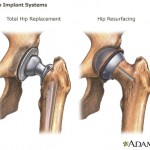
The company’s DePuy Orthopaedics division is facing 3,000 lawsuits filed over the recalled model. And a subsequent model that was supposed to represent an improvement has developed problems of its own, generating nearly 1,600 pending lawsuits.
The artificial hip model recalled in 2010 is the ASR. The newer model is the Pinnacle hip system. Both feature a head and a socket coated in a mixture of cobalt and chromium, and both are manufactured by DePuy Orthopaedics. The metal-on-metal implants were touted as being more durable than earlier plastic and ceramic models, although they were approved under a regulatory loophole without clinical testing.
The ASR recall came about because of the model’s high early failure rate, and its tendency to shed toxic metal debris that got in patients’ soft tissues and bloodstream.
And though the final failure rate for the ASR device hasn’t yet been established, a study released last March by the British Orthopaedic Association and the British Hip Society indicated a failure rate of up to 49 percent after six years. That’s nearly four times the rate that DePuy cited when it recalled the device.
The Chicago Tribune quotes Dr. David Langton, an orthopedist who has studied all-metal implants for years, as saying he expects the ASR failure rate to rise to 80 percent at eight years.
DePuy insists that the Pinnacle system is less prone to failure, because the head is smaller and thus less prone to both early failure and shedding debris. But the report quotes some medical professionals as saying they consider any model of metal-on-metal implants to be inherently suspect.
Based on a cohort of about 1,000 patients he is tracking in the UK, Langton said the Pinnacle hip has a failure rate of 8 percent at five years, which climbs to 16 percent after 6.5 years.
If you’ve received an all-metal hip implant, you should consult with a doctor if you have any ongoing symptoms or health concerns. If you have significant injuries, you should also consult with a DePuy hip lawyer familiar with the case to discuss your legal rights.
See the story here:
